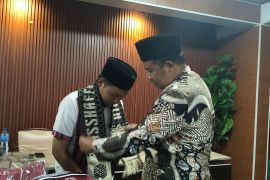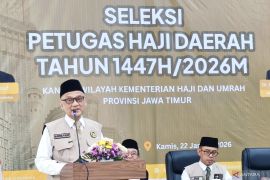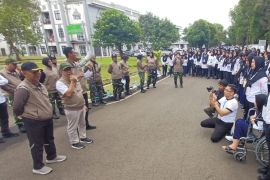Jakarta (ANTARA) - In late December 2024, an incident irked hundreds of Indonesian Umrah pilgrims who were scheduled to depart from Palembang, South Sumatra, to Saudi Arabia.Due to technical issues in their aircraft, as many as 380 travelers got stuck at Sultan Mahmud Badaruddin II Airport, Palembang, for more than 24 hours.
This was not an isolated incident. In recent years, the surge in the number of Umrah pilgrims from Indonesia, whose number reached more than two million by September 2024, has been accompanied by various challenges in organizing the pilgrimage.
One of the main problems is the capacity of airlines, which is not sufficient to keep up with the demand Airlines serving international routes such as Saudi Airlines, Garuda Indonesia, Qatar Airways, and Emirates are often unable to meet demand.
Thus, other airlines such as Lion Air, Batik Air, and Citilink have entered the Umrah pilgrimage market, though their operational readiness is still in doubt.
Chair of the Indonesian Hajj and Umrah Organizers Alliance (Asphuri), Faisal Ibrahim Surur, has also highlighted this fundamental issue.
He said that the delayed departure of Umrah pilgrims is often caused by the limited availability of backup aircraft with domestic airlines serving Umrah flights.
Without sufficient backup aircraft, technical issues in one plane can delay the departure of hundreds of pilgrims, as was seen in Palembang.
Umrah ecosystem
This year, the Umrah travel industry is predicted to become even more open and competitive.
This is in line with the Saudi Arabian government's regulations making it easier to grant visas; the country's Saudi Vision 2030, which seeks to increase non-oil revenues; and the increasing number of Indonesian Umrah pilgrims every year.
This should motivate Indonesia to create a healthy Umrah ecosystem.
The country, which is facing several challenges in realizing a well-integrated Umrah ecosystem, can learn from the success of other countries in managing and realizing a healthier Umrah ecosystem.
Baca juga: Dubes Saudi undang lebih banyak WNI berkunjung
For example, Malaysia has set an example with its collaborative approach between the government, airlines, and travel agencies.
Malaysia Airlines' special unit AMAL is proactively building strategic partnerships with Umrah travel agencies to ensure the availability of schedules and service quality.
One example is its cooperation with Andalusia Travel & Tours, which has lasted for 11 consecutive Umrah seasons. For the 2024–2025 Umrah season, the two again signed a memorandum of cooperation to ensure the provision of more integrated and reliable services.
The collaboration includes a seat-blocking system, where travel agencies can have certainty regarding the availability of seats. Meanwhile, airlines can plan their operations better.
This approach has helped bring down the flight delay rate in Malaysia to less than 5 percent.
This can be an inspiration for Indonesia as coordination between Umrah travel organizers and airlines often takes place without a mature strategic plan in the country.
The next step that needs to be taken is to strengthen regulations related to airlines serving Umrah trips.
Baca juga: Indonesia asks Saudi Arabia to build hadith museum at Istiqlal Mosque
The government should make backup aircraft a licensing requirement for airlines. Without a backup, the risk of departure delays would remain. In addition, regular technical audits of airlines should also be mandatory to ensure their operational readiness.
Technology can also be a solution to reduce the risk of flight delays. Real-time data-based monitoring systems can be used to track aircraft conditions, flight schedules, and potential technical issues.
Predictive technology that has been adopted by major airlines in the United States allows aircraft maintenance to be carried out proactively, not only when problems emerge.
For Indonesia, investing in this kind of technology can be a big step toward improving the reliability of Umrah flight services.
With the presence of a more sophisticated system, airlines can respond to technical issues more quickly, while travel agencies can provide more accurate information to pilgrims.
Hope
For Umrah pilgrims, the pilgrimage is a meaningful spiritual moment. Thus, delays in departure are not only detrimental in terms of time and money but also damage their trust in travel agencies.
Therefore, all parties must understand that organizing Umrah travel is not merely business, but a big responsibility.
President Prabowo Subianto has called for improving the Hajj and Umrah service system to make it more transparent, accountable, and comfortable for the public.
State-Owned Enterprises (SOEs) Minister Erick Thohir followed this up by emphasizing collaboration between the Ministry of SOEs, the Ministry of Religious Affairs, and the Hajj and Umrah Organizing Agency.
They all have agreed to remain committed to supporting and working together to improve services for pilgrims. The goal is clear: creating an integrated Hajj and Umrah ecosystem.
Through cross-sectoral cooperation between ministries and service providers, the government is determined to deliver high-standard services for the smooth running of the pilgrimage.
The hope is that Indonesia could set an example in building a professional and inclusive Hajj and Umrah ecosystem.
The Ministry of Religious Affairs has also taken an important step by forming a Civil Servant Investigator (PPNS) unit to supervise and enforce the law related to the implementation of the Umrah pilgrimage.
With the number of Umrah Pilgrimage Travel Organizers (PPIU) reaching 29,683 based on the Ministry of Religious Affairs' website, the ministry felt the need to form a PPNS.
In accordance with Law Number 8 of 2019, the PPNS of the Directorate of Hajj and Umrah Implementation has some special authorities.
They include enforcing criminal law in the implementation of the Hajj and Umrah pilgrimages, carrying out confiscations, and investigating people suspected of committing crimes.
However, strong regulations need to be accompanied by consistent implementation in the field. Otherwise, incidents like the one in Palembang will continue to happen.
Addressing the problem of delayed departures of Umrah pilgrims needs close collaboration between the government, airlines, and travel agencies.
Stricter regulations, the application of cutting-edge technology, and better coordination are essential steps that must be taken immediately because, in the end, the provision of good services to pilgrims is a form of respect for them.
The case in Palembang must be regarded as a reminder that delays are not merely about losing time, but also put people's trust at risk.
With joint commitment and the realization of a healthy Umrah ecosystem, the nation can ensure that the pilgrimage is a meaningful moment.
Pewarta : Hanni Sofia, Raka Adji
Editor:
I Komang Suparta
COPYRIGHT © ANTARA 2026









